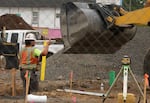Amid a housing shortage, Portland City Council is considering tweaks to city development rules to incentivize construction across the city.
But not all council members agree on the proposed changes. The debate, which came to a head at a Wednesday council meeting, pits environmental concerns against the region’s housing needs.
After nearly a year of discussion, the city’s planning commission sent a list of 15 recommendations to City Council last month meant to help developers cut costs on new residential construction. That includes a proposal to temporarily reduce the number of bike parking and truck loading spaces at apartments, waive a requirement for developers to meet with neighbors before breaking ground, and fast track the design review process for some housing types. The recommendations are touted as a way that the city can meet its goal of building around 120,000 units of new housing by 2045 to meet its population needs.

FILE: A construction worker directs a backhoe to drop gravel off in the trench of the Glisan Landing construction site in Portland last summer.
Caden Perry, Caden Perry / OPB
“This is a very meaningful step forward that shows Portland is serious about housing,” said Commissioner Carmen Rubio at the Wednesday meeting, where commissioners were briefed on the recommendations.
While developers and real estate leaders have expressed support of the recommendations, several say they would like them to go further to save builders money. They’ve lobbied the city to drop a few other development requirements, specifically ones designed to benefit the environment.
They have the ear of at least one city commissioner. Less than 24 hours before the council briefing on the recommendations, Commissioner Rene Gonzalez submitted several amendments to the proposal. One would temporarily rescind a policy mandating all new buildings in the city’s urban core have eco-roofs–a layer of vegetation that helps reduce the city’s greenhouse gas emissions. Another would temporarily remove a rule requiring these buildings also have bird-safe windows, which are designed to prevent birds from crashing into buildings.
The planning commission considered these proposals last year. The nine-member commission ultimately voted against pausing bird-safe window requirements, citing copious public testimony in opposition. They did include a change to the eco-roof policy, which allows developers to install solar panels instead of an eco-roof.
While the commission initially disagreed on these changes, they were reflected in the final recommendations with majority support. Gonzalez said his concerns lay with the planning commission’s initial disagreement – alone with feedback he’s heard from developers.
Gonzalez’s last-minute suggestions drew opposition from government transparency advocates and environmental activists.
“Green roof mandates and bird safe building requirements are important environmental programs for the city, both won through extended public processes when they were adopted,” said Olyssa Starry, an urban ecology professor at Portland State University. “Our community is really tired of politicians who try to use the housing crisis as a pretext to roll back environmental and housing regulations.”
Real estate representatives shared an alternate perspective. Doug Burges, a development director at real estate company Greystar, explained that the cost of adding bird-safe windows to an apartment complex would compel his company to raise rents by about $700 a year.
“These items have significant cost and impact on our ability to finance our projects and have a direct impact on renters,” Burges said.
City Council was initially expected to vote on Gonzalez’s amendments at the Wednesday meeting. But after pushback from the public — and several City Council members, including the mayor — commissioners decided to move the vote to next Wednesday.
Rubio’s office said she opposes Gonzalez’s amendments. It’s not yet clear how her fellow commissioners will vote.
